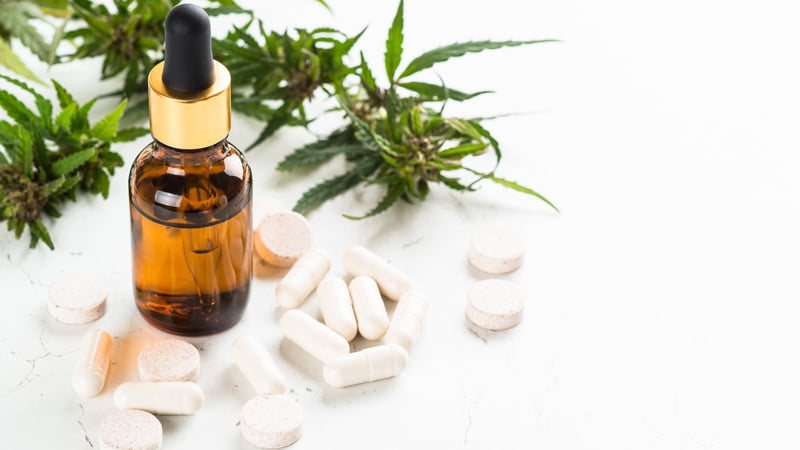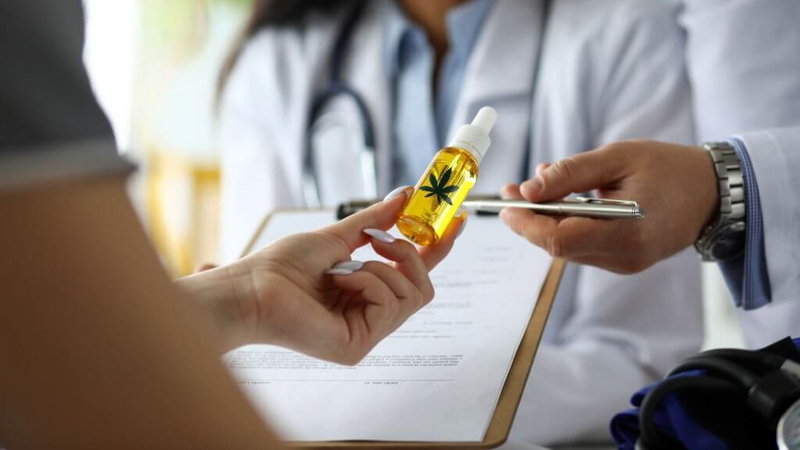CBD and Levothyroxine: What Happens When You Mix Them Together?

Levothyroxine is a popular thyroid medicine that serves as a substitute for a hormone that the thyroid gland should naturally produce to regulate the metabolism, growth, and development of the body. When the thyroid is unable to do this on its own, this disorder is called Hypothyroidism
CBD oil is an alternative treatment for hypothyroidism. Like most other diseases, inflammation is also a significant contributor to hypothyroidism, and CBD is famous for its anti-inflammatory properties.
Levothyroxine and Hypothyroidism Treatment
Levothyroxine may be the most commonly known treatment for hypothyroidism, which means an under-active thyroid gland. The primary job of the thyroid gland is to secrete thyroid hormone which helps to regulate the body’s metabolism and growth. Once the gland has become incapable of producing this hormone, levothyroxine acts as a substitute for the missing thyroid hormone.
Levothyroxine comes in either an oral or injectable form, and it is strictly on prescription. The oral form could either be a tablet or capsule. Oral levothyroxine tablets may need to be taken with other medications as they are primarily for part of combination therapy. Levothyroxine also helps in the treatment of goiter and certain types of thyroid cancer.
CBD and Hypothyroidism Treatment
A study evaluated the clinical significance of CB1 and CB2 expression in the human body and found out they are highly concentrated, especially in the thyroid gland. These receptors showed the potential for serving as a blocker to the spread of malignant cells present in the thyroid gland.
Another study has found that CBD may be effective in easing chronic inflammatory and neuropathic pain. These receptors in rat thyroids seemed to be capable of influencing the T3 and T4 hormone release. The study was conducted on rats and, as such, hasn’t been verified in humans.
There is a significant need for more studies on how CBD oil helps with the thyroid in humans. However, the research conducted so far has shown a lot of promise on CBD’s effect on hormonal activities. CBD may also help treat the symptoms associated with thyroid conditions, such as pain, weight gain, fatigue, depression, and anxiety.
Interaction Between Levothyroxine and CBD oil

Knowing that both levothyroxine and CBD oil serve the same purpose, which is treating hypothyroidism, you may wonder if it’s appropriate to use both forms of medication simultaneously. This is where you need to consider potential CBD-drug interactions. CBD oil and levothyroxine compete for metabolism, and they both require the same pathway to metabolize, which is the cytochrome P450.
A study in 2017 discovered that if a patient takes both levothyroxine and CBD oil simultaneously, this may result in a case where more thyroxine becomes compiled before the body metabolizes it due to the aforementioned interaction. When this happens, it results in another disease called Hyperthyroidism. Other risks involved with the interaction of levothyroxine and CBD oil involve anxiety and mild nausea.
However, if a patient spaces out the time frame between the use of Levothyroxine and CBD oil, there may be minimal or no effect at all, as found in a couple of patients. Nonetheless, you will need to consult your doctor to establish the right routine for both compounds.
Choosing Between Levothyroxine and CBD oil
Now you know that using both levothyroxine and CBD oil is not entirely risk-free, except when it is well-spaced — and even at that, you may need a doctor’s supervision.
So, before you go on with deciding on whether or not you should include CBD in your supplementation plan, let’s take a look at the pros and cons of both substances.
Like every other medication, both levothyroxine and CBD oils have their advantages and disadvantages. We will be looking at some of these, starting with levothyroxine.
Pros of Using Levothyroxine
- Safe for all ages and pregnant women: Levothyroxine is certified safe for adults and children, even as young as one to five years. It is also safe for pregnant women, unlike some drugs that are not advisable for women to use during pregnancy.
- Easy to use: Using levothyroxine is relatively easy compared to some other drugs, as you only have to take it once a day. Also, it’s not necessary to use it in the morning alone; if you have busy morning schedules, you can choose to use your levothyroxine at night.
- Affordability: For a substance that is quite beneficial in treating a crucial disorder, levothyroxine is somewhat cheap and affordable.
Cons of Using Levothyroxine
- Interaction with food and other medications: It is best to use levothyroxine on an empty stomach as other drugs or even food may interact with it and, as a result, hinder it from being effective. Patients should use levothyroxine an hour before eating or using other medications.
- It takes a long time to figure out the correct dose and see the result: The right dose for levothyroxine varies from one person to another. As a result, it might take weeks or even months to find the correct dose because you can’t figure out if the medication is working for 6-8 weeks, which is the time frame to see the full effect of levothyroxine. Sometimes, you may require a routine blood test to ensure you are using the correct dose.
- You have no liberty of missing doses: If you forget to use your medication a few times, you will start feeling all the symptoms associated with hypothyroidism again. These symptoms include fatigue, constipation, dry skin, and weight gain.
Pros of Using CBD oil
- CBD is a versatile therapeutic compound: It modulates the endocannabinoid system (ECS), resulting in the regulation of hormonal activity. Therefore, it has the potential to help with thyroid disorders and associated symptoms.
- Easy to get: CBD oil is legal in most places in the world. You can buy CBD without a prescription from a doctor.
- It is non-addictive: A study proved that CBD is not habit-forming, unlike the whole cannabis itself. This makes CBD safe for daily consumption.
Cons of using CBD oil
- Not enough practical evidence: There are limited studies on the effect of CBD oil when it comes to treating thyroid disorders in humans.
- Interaction with other drugs: CBD tends to often interact with other medications, thereby bringing a counter-productive result. This theory was deduced in a 2017 research. Hence, it is essential to consult with a doctor who has vast experience in cannabis use before you embark on starting a CBD product.
- Most CBD products are unregulated: Most CBD products sold randomly online are not regulated, and as such, it may be difficult to find out if the product contains what the label claims.
How to Choose the Right CBD for Hyperthyroidism and Other Thyroid Diseases?

Cannabinoids aren’t the only beneficial compounds in cannabis. Other phytonutrients include terpenes, flavonoids, amino acids, essential oils, and tetrahydrocannabinol (THC). If you want to enjoy the benefits of all these nutrients, then you should opt for full-spectrum CBD.
However, if you don’t want to ingest even trace amounts of THC, you can go with the broad-spectrum CBD. This option has a similar phytochemical profile to the full-spectrum CBD — except for THC.
Isolates are the purest form of CBD because they don’t contain other compounds from hemp. They’re flavorless and odorless and contain the highest amount of CBD per serving. However, unlike the two above formats, CBD isolate doesn’t leverage the whole-plant synergy, making it the least desired type of cannabidiol.
Once you’ve decided on the type of CBD you want to go for, there are still a few details to keep in mind. These include:
- Buying only from reputable manufacturers. CBD brands are sprouting every month, and it may be hard to figure out which ones produce high-quality products; hence, it is necessary to do your research before making a purchase.
- Request a Certificate of Analysis (CoA) of the product you want to buy. Companies that fail to provide these documents aren’t worth your trust because they might have something to hide about the quality of their products.
- Consult a doctor experienced in using CBD or cannabis with their patients. Doing so will help you avoid negative interactions with thyroid medications and figure out the right dosage for your situation.
- When purchasing from an online store, be sure to check user reviews, as this will give you insight into how good the product is. Also, if you are making a physical purchase, find out if the store is legally authorized to sell CBD products.
How to Use Levothyroxine?

Here are some useful tips for taking Levothyroxine if you have a thyroid disorder:
- For maximum effect, you should take levothyroxine on an empty stomach. Doing this will make the absorption process go on smoothly without interference of any form.
- Please pay attention to your diet while on levothyroxine because some particular food may work against it in the body. These foods include soybean flour, walnuts, and cottonseed meal.
- Conduct blood tests to figure out if you are on the correct dose because anything short of that will cause levothyroxine to be ineffective in your body.
How to Use CBD Oil?
CBD can be taken in many different forms. If you’re new to CBD, you may want to consider oral forms, such as gummies or capsules. They offer a fixed dose of CBD per serving and provide longer-lasting effects despite a delayed onset.
For a faster effect, you can go for tinctures and drops. This format works by placing a dose of CBD under the tongue with a dropper; after 60 seconds, you swallow the oil. You will start seeing the effect in 15–30 minutes, and the results should last for about 4–6 hours.
Vaping offers the fastest and most effective way to deliver CBD to your system because it uses the lung tissue for absorption. The effects are almost instantaneous — kicking in after 5 minutes — but they last shorter than other forms. On the other hand, vapes come with the highest bioavailability of CBD.
The time it takes for CBD oil to work on your system depends on how you consume CBD. Some need anywhere from a few minutes while others a couple of hours.
Summary
Over the years, Levothyroxine has been a reliable treatment option for hypothyroidism and will continue to be. However, CBD oil is showing the potential of being worthy competition for levothyroxine, and if there is more research on how effective CBD oil can be in treating hypothyroidism and other thyroid disorders such as chronic lymphocytic thyroiditis, it will become even more popular among patients with hypothyroidism.
While both substances may effectively treat hypothyroidism, you shouldn’t take them simultaneously. If you do this, it may lead to another dysfunction like hyperthyroidism. However, if you space out the usage, the risk of both drugs interacting and becoming counterproductive can be reduced to a bare minimum.
Regardless of your choice, make sure to consult a doctor before starting your CBD treatment. A qualified health professional will be in the best position to help you figure out the right dosage and establish a safe routine to avoid interactions with medications.
References
- Eleftheria, L., Constantinos, G., Maria, T., Paraskevi, A., Ioanna, D., Ioanna, G., George, K., Efstratios, P., & Stamatios, T. Clinical significance of cannabinoid receptors CB1 and CB2 expression in human malignant and benign thyroid lesions. 2015. (1)
- Wei, X., Tanxing, C., Kejung, C., Fei, Y., Shao-Rui, C., Dan, W., Yun, G., Hui-Lin, P., Ke, R., Yan, X., & Li, Zhang. Cannabinoids suppress inflammatory and neuropathic pain by targeting g3 glycine receptors. 2012.
- Researching marijuana for therapeutic purposes: The potential promise of Cannabidiol (CBD). 2015.
- Kimberly, L., & Susan, L. CBD for Thyroid health. 2021.
- Echo. Can CBD help with thyroid disorders? 2017.